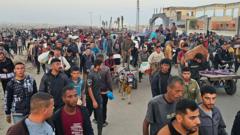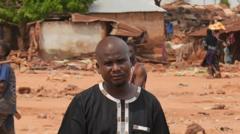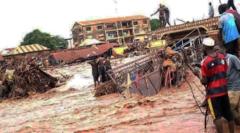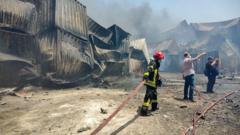Authorities report over 200 fatalities due to unprecedented flooding in Mokwa, with rescue missions suspended amid fears that no survivors remain. Survivors recount harrowing experiences as relief efforts commence.
Catastrophic Floods in Nigeria Claim Over 200 Lives as Rescue Efforts Halt

Catastrophic Floods in Nigeria Claim Over 200 Lives as Rescue Efforts Halt
The deadly floods that swept Mokwa, Niger State, have resulted in a rising death toll and an ongoing search for the missing.
The recent floods in Mokwa, North-Central Nigeria, have led to a tragic increase in the death toll, which now exceeds 200 lives lost, according to local officials. With around 500 individuals still unaccounted for, the community is grappling with the aftermath of what has been described as the worst flooding event in the region in the last 60 years. Musa Kimboku, the deputy chairman of Mokwa Local Government, confirmed that rescue operations have been halted as authorities brace for the grim reality that no survivors are likely to be found.
The torrential rains that began earlier this week severely impacted surrounding areas, including Tiffin Maza and Anguwan Hausawa. Muhammadu Aliyu, Mokwa's district head, announced plans to recover bodies buried underground in order to mitigate public health risks. The accounts of survivors paint a harrowing picture of the disaster; one man, Adamu Yusuf, tragically witnessed the loss of his wife and newborn child as floodwaters engulfed their home. "I watched helplessly as water washed away my family," he recounted, emphasizing his survival was solely due to his swimming ability.
Another resident, Saliu Sulaiman, expressed his devastation over financial losses, revealing he lost roughly $1,500, which was meant for his family's livelihood after selling farm produce just the day before. Having contemplated retrieving his earnings amidst the chaos, the frightening strength of the rising water persuaded him to stay put.
In response to this disaster, the National Emergency Management Agency (NEMA) has initiated a relief effort, distributing essential packages to those affected. The agency also reported significant infrastructure damage, as roads and bridges have been severely impacted, disrupting local economic activities and traffic flow.
The Nigerian Red Cross issued a statement recognizing the dire implications of the floods, citing considerable loss of life and widespread distress among the populace. Flooding tends to occur regularly during Nigeria's rainy season, which spans from April to October, and has frequently resulted in severe loss of life and displacement in previous years. Last year's flooding claimed over 600 lives and displaced 1.3 million people, indicating a growing pattern of environmental challenges affecting the region.















